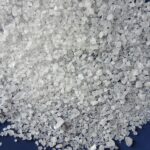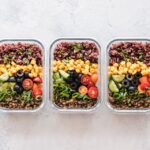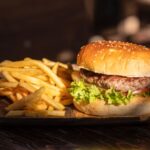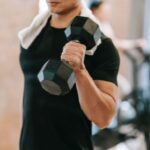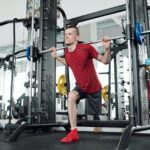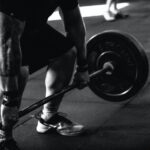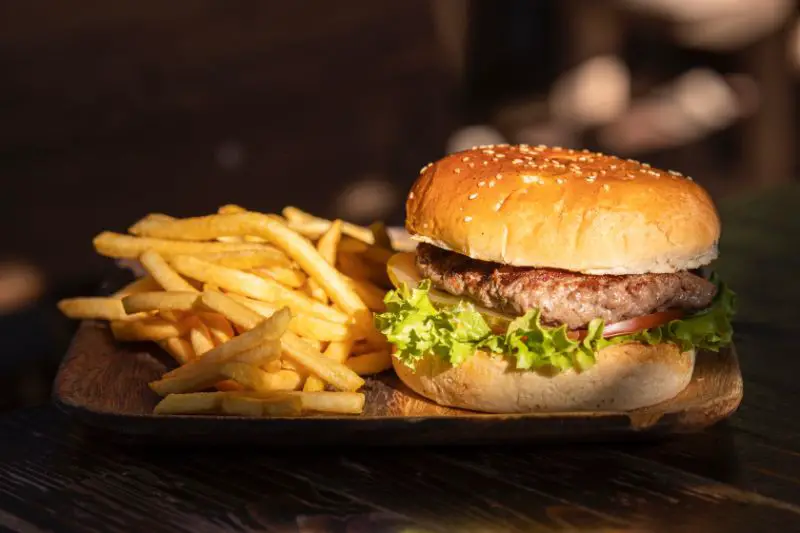
Table of Contents (click to expand)
The Importance of Nutrition in Weightlifting
Weightlifting and other forms of strength training put significant demands on your body. This physical stress can be positive, increasing muscle strength and endurance, improving cardiovascular health, enhancing bone density, and many other benefits.
However, fueling your body and muscles correctly is critical to gain these benefits and ensure optimum performance.
Whether you’re a seasoned bodybuilder or a beginner embarking on your strength training journey, your nutrition plays a crucial role. Proper pre-workout nutrition enables you to train harder, promotes muscle strength, and aids in reducing muscle damage. Moreover, your food choices can significantly impact your energy levels, your ability to concentrate, and how well you recover after your workout.
Related: How Many Weeks is Considered a Weight Loss Plateau?
Why What You Eat Before a Workout Matters
Eating the right foods before a workout provides the energy to power through a tough training session. Not only does it improve athletic performance, but it also aids in muscle growth and recovery. Studies suggest that optimal pre-workout nutrition also helps with weight loss, encouraging the body to burn more calories during and after a workout.
The complex relationship between diet and exercise is a growing field of research in sports medicine. Current evidence suggests that both what you eat and when you eat can significantly influence the effectiveness of your workouts. However, each person’s optimal pre-workout meal may differ based on individual goals, overall diet, exercise intensity, and personal digestion and comfort levels.
Understanding Muscle Protein Synthesis
The Role of Protein in Bodybuilding
Protein is vital for muscle protein synthesis, the process responsible for new muscle growth. Consuming high-quality protein sources, such as Greek yogurt or whey protein, provides essential amino acids that boost this synthesis. This leads to greater muscle mass and improved body composition.
Protein also helps repair muscle damage during a workout, helping you recover more quickly and prepare for your next training session. Plus, protein can help increase feelings of fullness, which is beneficial if weight loss is among your workout goals.
Related: How Many Push Ups a Day to Build Muscle: A Comprehensive Guide
Muscle Protein Synthesis and Its Importance in Muscle Mass Growth
We must balance muscle protein synthesis with muscle breakdown to build muscle effectively. This balance is influenced by exercise and nutrition. Resistance or strength training stimulates muscle protein synthesis, and when exercise is combined with adequate protein intake, it results in muscle mass growth.
Research from the American College of Sports Medicine suggests that consuming a source of protein before you exercise can help fuel muscle protein synthesis and improve muscle recovery. Aiming for 20-30 grams of protein in your pre-workout meal is a good general guideline.
Carbohydrates and Weightlifting
Carbohydrates: An Essential Energy Source for Weightlifters
Carbohydrates play a crucial role in pre-workout nutrition as they fill the muscle glycogen stores – the body fat’s primary energy source during an intense workout.
Foods like whole-grain bread or brown rice are excellent sources of complex carbohydrates that provide steady energy throughout your workout. In contrast, more straightforward carbs, such as those found in a banana, can provide more rapid energy delivery.
Related: When to Drink Protein Shakes for Weight Loss
Timing and Types of Carbohydrates for Optimum Results
Consuming carbohydrates about 1-3 hours before a workout allows your body to store enough energy to fuel your training during mid-workout sessions. Some research suggests that consuming carbs before a workout can increase your endurance capacity, allowing you to work out longer and more intensively.
The Power of Protein
How Protein Fuels Muscle Mass Growth
Consuming enough high-quality protein before a workout initiates muscle protein synthesis and helps minimize muscle breakdown during the workout. This is essential for endurance athletes and those focused on building muscle.
Optimal Protein Choices for Pre-Workout Meals
A balanced meal with high-quality protein could include Greek yogurt with mixed berries or a whole wheat tortilla filled with lean chicken or turkey. Some may prefer a protein shake with almond milk, especially for an on-the-go pre-workout meal.
Importance of Healthy Fats for Weightlifting
Understanding the Role of Healthy Fats in Muscle Building
Healthy fats are another crucial macronutrient for those pondering what to eat before lifting weights. They provide long-lasting energy, particularly beneficial for extended and low to moderate-intensity workouts.
Best Sources of Healthy Fats for Pre-Workout Meals
Incorporating healthy fats into your pre-workout meals is as easy as adding a spoonful of almond butter to your toast or blending some avocado into your protein shake. These foods provide satiety and sustained energy.
Related: How Much Water Should I Drink for Weight Loss?
Hydration and Its Importance in Weightlifting
Water: A Key Component in Pre-Workout Nutrition
Hydration is essential for maintaining energy levels and preventing muscle fatigue during workouts. A sports drink can be beneficial, especially during longer workout sessions, as it helps replenish lost electrolytes.
Hydration Strategies for Weightlifters
Drink water throughout the day and consume about 500ml 2-3 hours before your workout. For longer, more intense workouts, a sports drink might be helpful to replace lost electrolytes.
Pre-Workout Meal Ideas
Balanced Pre-Workout Meal Ideas for Enhanced Performance
A balanced pre-workout meal might include whole wheat toast with almond butter and banana slices or a bowl of brown rice with chicken. These meals combine complex carbohydrates, protein, and healthy fats to provide maximum energy, boost muscle protein synthesis, and aid endurance.
Pre-Workout Snack Ideas for Quick Energy Boost
If you’re tight on time, a simple pre-workout snack could be a slice of whole-grain toast with nut butter or Greek yogurt with mixed berries. These snacks are designed to provide a quick, easily digestible energy source.
Post-Workout Nutrition: A Crucial Aspect of Recovery
Understanding the Post-Workout Anabolic Window
The post-workout period, also known as the anabolic window, is when your muscles are primed for nutrient absorption. Consuming the right nutrients during this period helps improve recovery, boost muscle protein synthesis, and replenish muscle glycogen stores afterward.
Post-Workout Snack Ideas for Optimal Muscle Recovery
Post-workout snack ideas might include a whey protein shake to keep energy levels and stimulate muscle protein synthesis or chocolate milk, which offers a good balance of protein and carbohydrates. These snacks promote muscle recovery and prepare your body for the next workout.
Nutrient Timing: What and When to Eat Before Lifting Weights
Guidelines for Pre-Workout Meal Timing
Pre-workout meal timing can be a crucial factor in workout performance. Aim to have a balanced meal 2-3 hours before your workout. A minor snack 30-60 minutes prior can still provide benefits and improve performance if that’s impossible.
Adjusting Your Pre-Workout Meals for Morning, Afternoon, and Evening Workouts
Your pre-workout meals may differ based on when you work out. A light breakfast, like toast with nut butter or a banana, may be beneficial for a morning workout. Ensure your lunch or dinner balances protein, carbohydrates, and fats for afternoon or evening workouts.
Frequently Asked Questions
What should I eat 30 minutes before a lift?
Eating a well-balanced meal or snack about 30 minutes before your lifting strength training session can provide your body with the necessary energy and nutrients. Ideally, focus on consuming a combination of carbohydrates and protein.
Carbohydrates give a quick energy source, while protein aids muscle repair and growth. Some suitable options include:
- Fruit and yogurt: A small serving of fruit, such as a banana or apple, paired with a yogurt cup.
- Nut butter and whole grain bread: Spread nut butter, like almond or peanut butter, on a slice of whole grain bread.
- Protein shake: A protein shake with a mix of protein powder, water, milk, and perhaps a tiny amount of fruit.
Avoid consuming large meals right before a workout, as they have extra calories and can make you uncomfortable and lead to indigestion.
Should I eat before lifting weights?
Eating before lifting weights is generally recommended, as it can give your body the necessary fuel to perform at its best. The type and timing of your pre-workout meal or snack may vary depending on individual preferences and goals.
However, consuming a light meal or snack around 1-2 hours before your workout is an excellent guideline. This will allow enough time for digestion and nutrient absorption, avoiding discomfort during exercise.
If you prefer to work out early in the morning or struggle with larger meals before exercise, a small snack or liquid meal replacement can be consumed 30 minutes to an hour before your workout. Experiment with different options to find what works best for your body and provides the energy you need for a cardio workout.
What not to eat before lifting?
While it’s important to eat before lifting weights, there are certain foods you should avoid consuming before a workout. Here are some examples of what not to eat before a workout:
- Heavy and greasy foods: Foods high in fat and oils, like fried foods, can slow digestion and make you feel sluggish during your workout.
- Spicy foods: Spicy dishes can cause indigestion and heartburn, which can be uncomfortable during physical activity.
- High-fiber foods: While fiber generally benefits overall health, consuming large amounts of high-fiber foods, like beans or cruciferous vegetables, before a workout may lead to bloating and gas.
- Large meals: Eating a big meal right before lifting weights can make you feel full and uncomfortable, potentially interfering with your performance.
Instead, focus more energy on lighter, easily digestible options that balance carbohydrates and protein, as mentioned earlier.
Listening to your body and experimenting with different foods and timing to find what works best for you individually is essential. Consulting with a registered dietitian or nutritionist can also provide personalized guidance based on your specific goals and needs.
Related: How to Drink Kombucha for Weight Loss
Conclusion
Recap of Key Points on What You Should Eat Before Lifting Weights
To summarize, fueling your body with the right foods before a workout is essential to maximize performance, muscle growth, and recovery. This involves consuming a balanced meal containing high-quality protein, complex carbohydrates, and healthy fats.
Final Thoughts and Tips for Successful Nutrition in Weightlifting
Understanding your nutritional needs can significantly improve your weightlifting performance and results. Always listen to your body, stay hydrated, and remember that each person may need to adjust these guidelines based on their body weight, workout intensity, and goals.
As always, when making significant changes to your diet, consulting with a registered dietitian or a professional in sports nutrition can be beneficial.
By comprehensively addressing pre-workout nutrition and what to eat before weightlifting, you’ll be well on your way to achieving your strength training goals.





